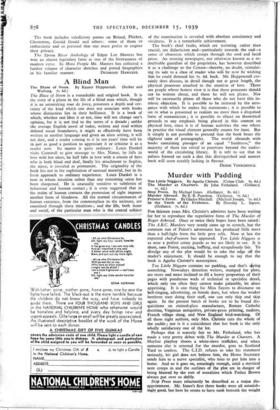Murder with Padding
Stop Press. By Michael Innes. (Gollancz. 8s. 6d.) (Gollancz. 7s. 6d.)
FOR thirteen years Mrs. Christie's admirers have been waiting for her to reproduce the superlative form of The Murder of
Roger Ackroyd. Once or twice their hopes have been raised: The A.B.C. Murders very nearly came up to scratch, but the common run of Poirot's adventures has produced little more than a half-light from the little grey cells. Now at last the expected chef-d'oeuvre has appeared. Ten Little Niggers is as near a perfect crime puzzle as we are likely to see. It is short, sans Poirot, exciting, baffling, and scrupulously fair. To divulge any of the plot would be to take the edge off the reader's enjoyment. It should be enough to say that the book is Agatha Christie's masterpiece.
Ten Little Niggers contains no padding, and that's siiying something. Nowadays detection writers, stumped for plots, are more and more inclined to fill a heavy proportion of their pages with ponderous wads of technical or specialist detail, which only too often they cannot make palatable, let alone appetising. It is one thing for Miss Sayers to discourse on bell-ringing, advertising, or female dons, but when the weaker brethren start doing their stuff, one can only skip and skip again. In the present batch of books are to be found dis- quisitions on stained-glass manufacture, Roman Catholic doctrine, Virginian antiquities, private-press printing, nudism, French village slang, and New England bird-watching. Of all these eight authors, only Mrs. Christie cuts the whole of the cackle ; nor is it a coincidence that her book is the only
wholly satisfactory one of the lot.
Perhaps that is scarcely fair to Mr. Fethaland, who has made a very pretty debut with The Murder at Charters. A Mayfair playboy shoots a white-slave trafficker, and when someone else is arrested for the murder, goes to Scotland Yard to confess. The C.I.D. refuses to take his statement
seriously, his girl does not believe him, the Home Secretary
sends him to a nerve specialist, who tries to put him into a home. And so it goes on, amusingly enough, until a mystical
note creeps in and the outlines of the plot are in danger of being blurred by the sort of moralities which Father Brown always put over so deftly.
Stop Press must reluctantly be described as a major dis- appointment. Mr. Innes's first three books were all astonish-
ingly good, but here he seems to have sunk beneath the weight of his own vocabulary. After a spirited opening in Oxford, and one of the funniest descriptions of a senior common room ever written, the scene shifts to an enormous country house, stuffed with non-stop debaters. Nothing much happens, except that the lights are several times extinguished, gruesome practical jokes are perpetrated, and the debate continues. One stumbles on through this long welter of volubility to a somewhat lame conclusion, but many readers may find the proof of the padding too much for them.
Mr. Punshon is one of the dullest of writers, not quite so flat-footed perhaps as Mr. Freeman Wills Crofts, but longer- winded and less circumstantial. Murder Abroad is a perfectly competent and very slow story about the murder of an elderly Englishwoman, laden with uncut diamonds, in the Auvergne. One's expectation of life must be high if one is to pad along with Mr. Punshon. Or with Miss Mitchell, for that matter. Printer's Error might well be called Author's Error. It is both obscure and boring, and even the scenes in a nudist camp begin to pall when we find that it is not the ghastly Mrs. Bradley who is returning to nature. And what have the Arthurian chapter-headings to do with the case?
Lastly, the great Miss Sayers. In the Teeth of the Evidence contains seventeen short stories, almost all unsatisfying. The detective story was born as a short story, and remained so through the reigns of Edgar Allan Poe, Conan Doyle (with a few exceptions) and G. K. Chesterton ; but now, curiously enough, we have little patience with really short stories of detection. Miss Sayers's new volume opens well, with Lord Peter Wimsey in the clutches of an Old Wykehamist dentist, but only two stories deal with his Lordship's activities. There follow five episodes in the life of a colourless commercial traveller called Montague Egg, and the rest of the book con- tains miscellaneous crime stories. Among them are an amusing account of a barber's brainwave, and an excellent, almost surrealist, story called The Leopard Lady ; but the majority of the stories in the book seem to have escaped un- willingly from popular magazines. They have little twists in their tails, but one can almost always anticipate them. Remembering some of Miss Sayers's more elaborate back- grounds, one almost wishes she had supplied a little more









































 Previous page
Previous page